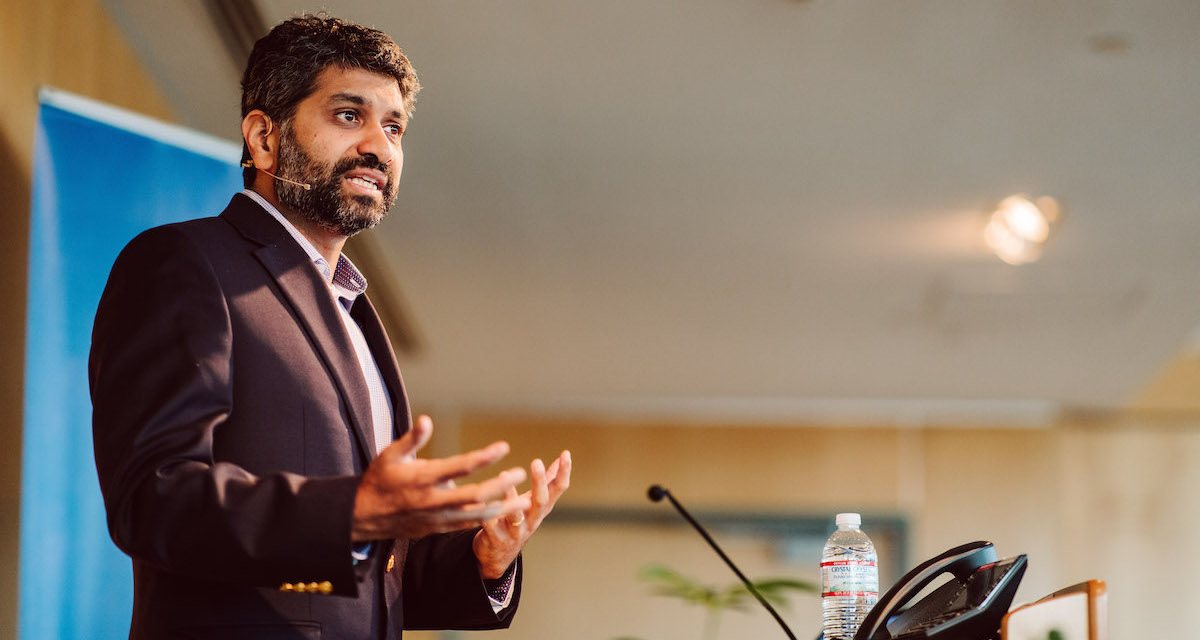6 Takeaways from the 2019 Herrmann Lectures
At the mention of a “brain machine interface,” a technology that allows a person’s brain to communicate directly to a machine, attendees of the 2019 Herrmann Lecture Series paused. But then a sea of “awe”s echoed through the room when, with goosebumps, Dr. Praveen Sethupathy shared a story about a paralyzed woman who, using a brain machine interface, maneuvered a mechanical hand—the first time she had controlled a limb in years.
“But [Elon] Musk wants to take this further,” Dr. Sethupathy continued. Suddenly, heartwarming became alarming—neuroscientists aren’t calling Musk crazy for anticipating a robot uprising.
This thought-provoking story was one of many Dr. Sethupathy told during his three days at Gordon. A top rising young investigator in genomics and a devout Christian, Dr. Sethupathy is no stranger to navigating the intersections of science and faith. Through each lens, and three lectures hosted by the Center for Faith and Inquiry, he examined issues that are connected to his area of expertise—the human genome—and the accompanying ethical questions, ultimately asking, “What does it mean to be human?”
The Bell collected the main takeaways from Dr. Sethupathy’s lectures for readers to ponder and compute:
Should we even be entertaining the idea of gene editing and, if so, what do we need to figure out first?
Just because we have the technology to edit the human genome, doesn’t mean we should do it. With the antiviral mechanism of CRISPR-Cas 9, gene editing is easier, cheaper and more effective than ever. In many cases genetic engineering is safe and ethical. But with the power to edit DNA that’s passed down to future generations, Dr. Sethupathy says society must ask, “Do you really have that right?”
“It’s not just about the safety and the efficacy of the procedure,” says Dr. Sethupathy. “It’s also about the legal implications and the societal implications. There are questions to be answered that go beyond the science.”
With CRIPSR-Cas9, how do we know for sure what is a treatment and what is an enhancement?
Frankly, there is a lot of grey area when it comes to answering this question. It’s hard to establish the hard line between using gene editing for treatment and using it for enhancement. In answering this, Dr. Sethupathy urges us to consider: 1) What’s going to be allowed and what’s not going to be allowed? 2) What does it mean to be human? 2) Are we changing the course of humanity in a way that’s unacceptable?
Is technology, like CRISPR-Cas 9, ultimately bad or good?
That’s really the wrong question here. Technology is rarely “bad” nor “good.” Dr. Sethupathy explains, “It’s the use of that technology” that has the potential to be good or bad. He continues, “[It’s] our posture toward that technology—why are we using it, how are we using it, what is that motivation?” The good news—most scientists err on the side of caution, too. “If [scientists] don’t have that conversation and set that line as a community, most will agree we’re overstepping on the utility of this technology.”
Does the randomness we observe in the universe mean that there isn’t any purpose to it?
Just because randomness exists in the universe and is inherent to many scientific phenomena, doesn’t mean there is a lack of purpose in creation. Even in biology, apparently random processes lead to ordered, predictable outcomes all the time.
“A really compelling example of this the formation of each of our human bodies, in our mother’s womb,” says Dr. Sethupathy. “The process by which each of us develops from a single cell to a whole organism—it’s been said that our cells play dice on route to becoming a fully formed heart cell, or brain cell or pancreas cell. But, despite the underlying randomness, at the end of the process, a human body emerges.”
Can science offer us a biological definition of what it means to be uniquely human?
Science doesn’t provide a clear definition of what it means to be human. Even our genetic makeup shows us that we are fundamentally connected to other living things.
“Littered throughout our genome, are genetic elements that originate from other species that we tend to think are completely unlike us. In fact, at least 10 percent of our human genome represents sequences from viruses that have integrated into our DNA. Even at the genetic level, you and I are one-tenth virus at minimum,” explains Dr. Sethupathy.
What does the Bible tell us about what it means to be human?
What it means to be human is twofold in Scripture:
1) To manifest the character and presence of God in the world.
Dr. Sethupathy says, “The phrase ‘image of God’ is only used for one species: us. My reading of Genesis is that the image of God is not primarily a biological feature—we don’t find it in our DNA—but rather a vocational calling that is unique to humanity. In other words, it is not what we are made of (the material substance) but rather what we are called to that sets us apart from the rest of biological life.”
2) To bring God joy.
“I believe it is not only our calling to reflect God’s character that makes us human,” says Dr. Sethupathy. “There’s something else. One day, when I was reading Psalm 104, one verse stood out to me. Verse 26 says that the leviathan was created simply so it could play in the water. I think it reminds us that while part of God’s wisdom in creation is indeed ordered with purpose, another part is simply defined by pleasure. At the heart of creation is God’s joy.”
To hear more wisdom from Dr. Sethupathy (or listen a second time), watch the 2019 Hermann Lecture Series on Gordon’s YouTube channel >
 The Bell
The Bell